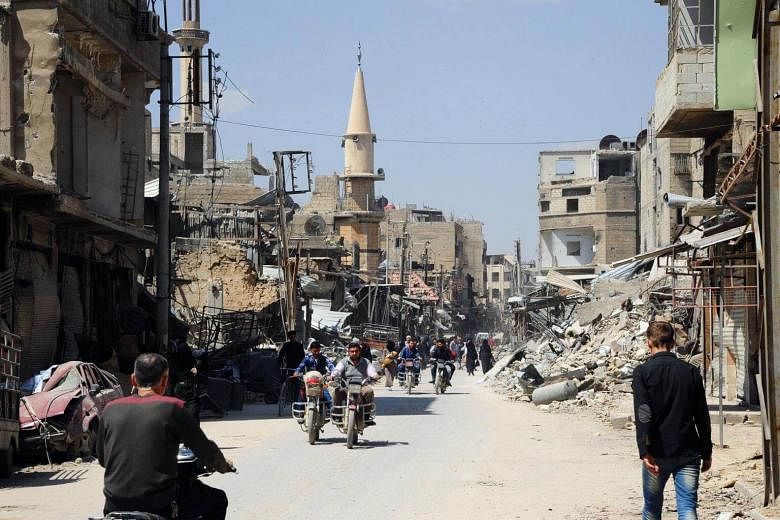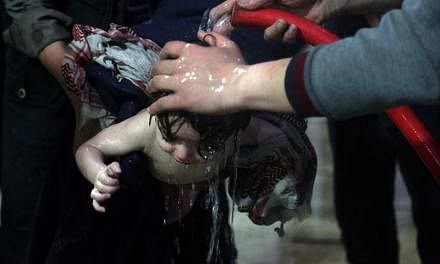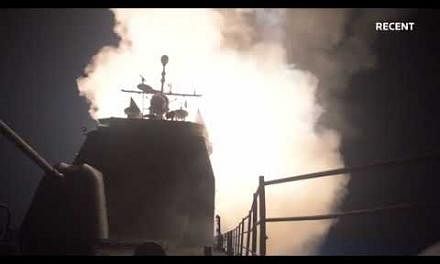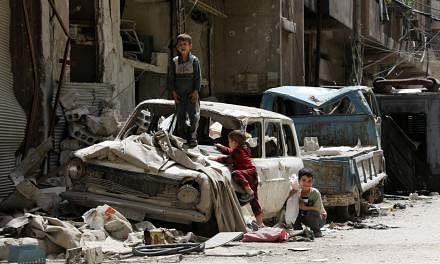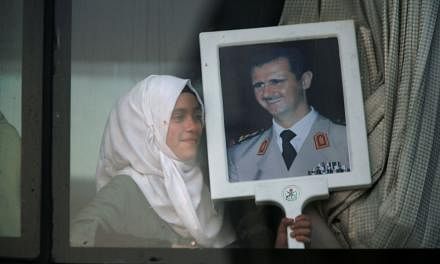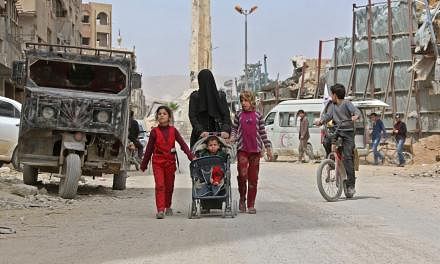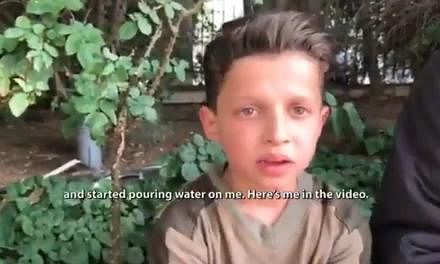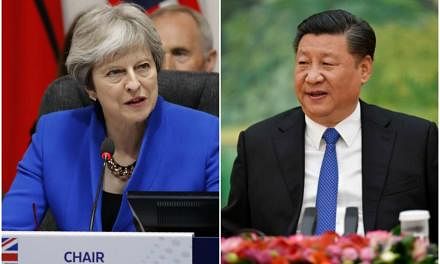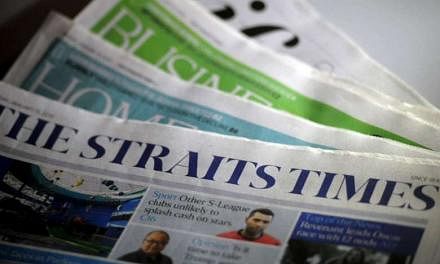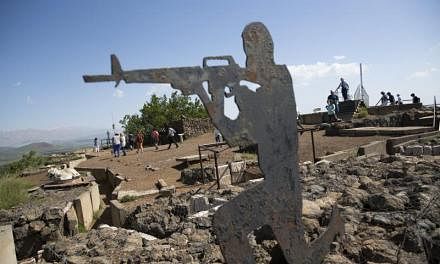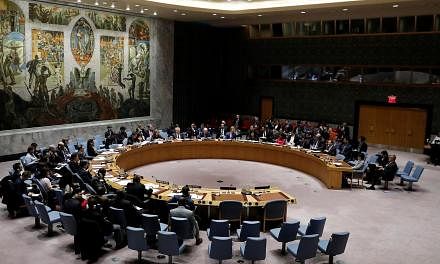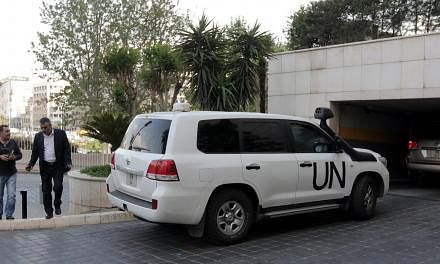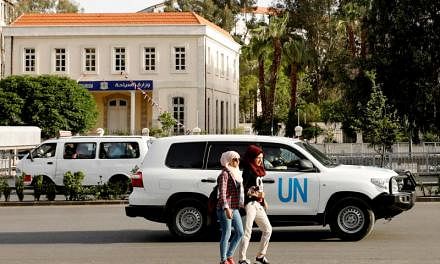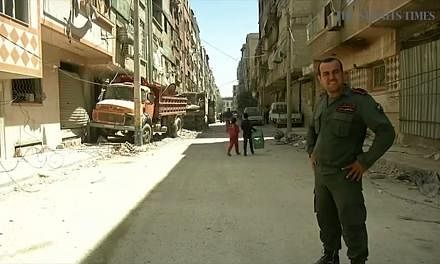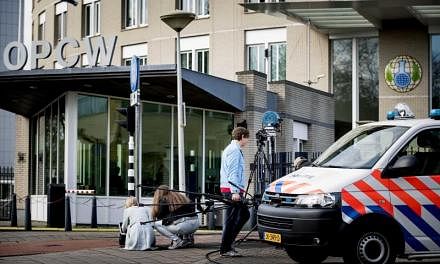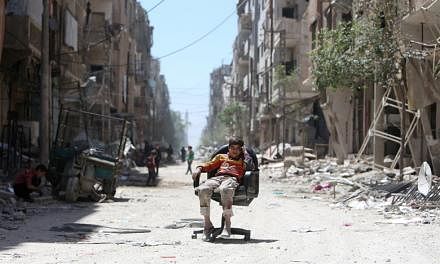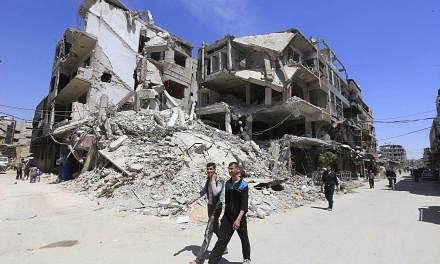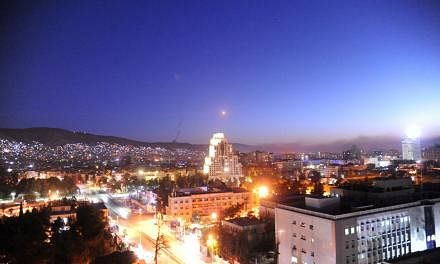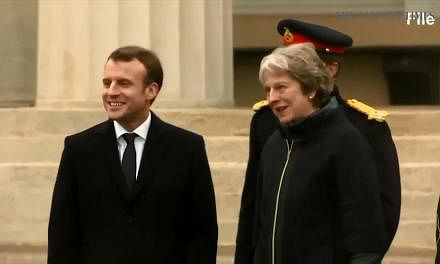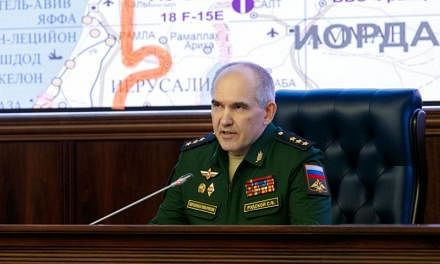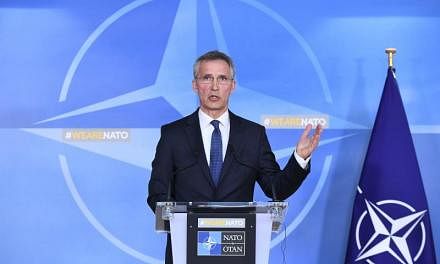BEIRUT (NYTIMES) - Two days after the United States and its allies launched missile strikes against the Syrian government, very little has changed for most Syrians, who have spent years suffering through their country's civil war.
In Damascus, hundreds demonstrated in support of President Bashar al-Assad, whose grip remained unchallenged.
In Raqqa, recently liberated from the Islamic State in Iraq and Syria (ISIS), teams defused mines the Islamists had strewn across the destroyed city.
Thousands of people from Douma, the site of the reported chemical attack that prompted the US strikes, looked for shelter after joining the millions of other Syrians who have been displaced from their homes.
And on the front lines separating hostile parties throughout the country, fighting continued as it has for years.
Now that the dust has settled from the US strikes, with President Donald Trump declaring, "mission accomplished," Russia logging complaints and Mr Assad returning to work, how does Syria move forward?
For tomorrow and the next day, at least, it will remain mired in its painful status quo: a multi-layered conflict with the Syrian people stranded in battles between global and regional powers.
The United Nations will keep organising talks that do not bring peace, and the Security Council will remain too divided to stop the bloodshed.
Seven years in, some now argue that the only realistic way to stop the war, prevent an extremist resurgence and allow the country to move on is to acknowledge that Mr Assad, with help from Iran and Russia, will remain in power and to effectively let him win.
Once the guns fall quiet, they say, Syria's other sizeable issues can be addressed: the fight between Turkey and the Kurds in the north; the shadow war between Iran and Israel; and the rebuilding of destroyed communities so that refugees can return.
Ceding that much to Mr Assad has long been anathema in Washington and other Western capitals, where policymakers believe he should be punished for his brutality during the war and have vowed not to contribute to reconstruction as long as he remains in power.
Some counter that if the West refuses to invest the resources needed to determine Syria's future, its efforts to penalise Mr Assad will make life worse for average Syrians.
"You are not punishing Assad, you are punishing the poor Syrian people," said Dr Joshua Landis, director of the Centre for Middle East Studies at the University of Oklahoma.
"If America's objectives are countering terrorism, stabilisation and the return of refugees, all of these will fail."
Mr Trump ordered Saturday's strikes, which were carried out in conjunction with Britain and France, to punish Mr Assad for an apparent chemical attack in Douma a week before.
The strikes were not intended to topple Mr Assad, damage the Russian and Iranian allies that support his troops, or protect civilians from violence.
In fact, they were meticulously planned and executed to avoid altering the overall dynamics of the conflict and keep the United States from getting dragged further in.
That frustrated Mr Assad's foes.
"The American strikes did not change anything for Syrians," said Mr Osama Shoghari, an anti-government activist from Douma who is struggling to start a new life in an unfamiliar town 289km away from his home. "They did not change anything on the ground."
The West's resistance to further intervention is good news for Russia and Iran, and of course for Mr Assad, who was happy Sunday, according to a group of Russian politicians who visited him.
"President Assad has an absolutely positive attitude, a good mood," said Ms Natalya Komarova, a member of the delegation, according to Russian news agencies.
But in an acknowledgement of the war's toll, another visitor reported that Mr Assad said rebuilding Syria could cost US$400 billion (S$525.04 billion).
If the primary message of the strikes was that Mr Assad could not use chemical weapons, a secondary message was that the West was going to leave him in power, no matter what else he did.
"Even if this is a chemical weapons deterrent, that leaves a whole arsenal of conventional means with which people can be killed in Syria with few real repercussions," said Mr Sam Heller, a senior analyst at the International Crisis Group who studies Syria. "There is every reason to expect that that will continue."
Seven years of conflict have seen Syria sliced up by world powers, with the Turks administering towns in the north, the United States working with Kurdish-led militias in the east, and Russia and Iran helping Mr Assad rout the remaining pockets of rebels elsewhere.
At this point, no one seems to have a realistic plan to broker a lasting peace between those forces that would bring Syria together again in a stable enough way to allow millions of refugees to return home and for rebuilding to begin.
Many discount the idea that Mr Assad can play a meaningful role in that process.
"It very shortsighted and erroneous in my mind," said Dr Maha Yahya, director of the Carnegie Middle East Centre in Beirut. "Facilitating a win for Assad is making sure that Syria remains the epicentre of instability in the region."
Research by the centre has found that if Mr Assad remains in power, it would discourage the return of Syrian refugees from neighbouring countries and Europe.
"They are not going back as long as Assad is in power because they don't believe that there will be safety and stability while Assad is there," Dr Yahya said.
The only solution, she said, is a settlement between Russia and the United States that other powers, like Turkey and Iran, could eventually be brought into.
But reaching such an agreement would involve an intensity of diplomatic efforts that Mr Trump's administration is not interested in.
After announcing Saturday's strikes, Mr Trump painted a pessimistic view of the United States' ability to effect change in the Middle East.
"No amount of American blood or treasure can produce lasting peace and security in the Middle East," he said. "It's a troubled place. We will try to make it better, but it is a troubled place."
He suggested that Arab allies could play an increased role, mentioning Saudi Arabia, the United Arab Emirates, Egypt and Qatar.
But the first two are bogged down in a war in Yemen, and the first three are locked in a bitter dispute with the fourth, making it unclear how they would work together to fix Syria.
Before the strikes, Mr Trump froze US$200 million in stabilisation aid for Syria and said that he wanted to bring home the roughly 2,000 US troops now in eastern Syria.
Besides working with a Kurdish-led militia known as the Syrian Democratic Forces to fight the Islamic State in Iraq and Syria (ISIS), the United States is helping restore areas like the city of Raqqa that were recently retaken from the extremists.
Given the tremendous damage to the city, this is a gargantuan task, said Mr Mustafa al-Abed, of the Raqqa Civil Council, which is supported by the United States.
Among his group's priorities are fixing the water and electricity networks, clearing rubble from roads and restoring irrigation networks so that farmers can plant.
But before that can happen, and before residents can return to their homes, the city must be cleared of the many mines and explosive booby traps that the Islamists planted before their defeat.
"They are everywhere," Mr Abed said of the mines. "In homes, in cars, in roads. There is no normal size or place. They are everywhere."
He was dismissive of Saturday's strikes, which he said were preceded by so many threats from Mr Trump that the Syrian government had ample time to evacuate buildings and hide sensitive materials.
"They have used all kinds of weapons," he said of the Syrian government's forces. "So the strikes should have been strong enough to break the back of the regime."
The only thing that was preventing the government, Russia and Iran from returning to his part of the country was the presence of US troops, he said. He feared what would happen if the United States left.
"We will go back to being a region of struggles, like we were before," he said. "We'll return to fighting and fear and blood."
